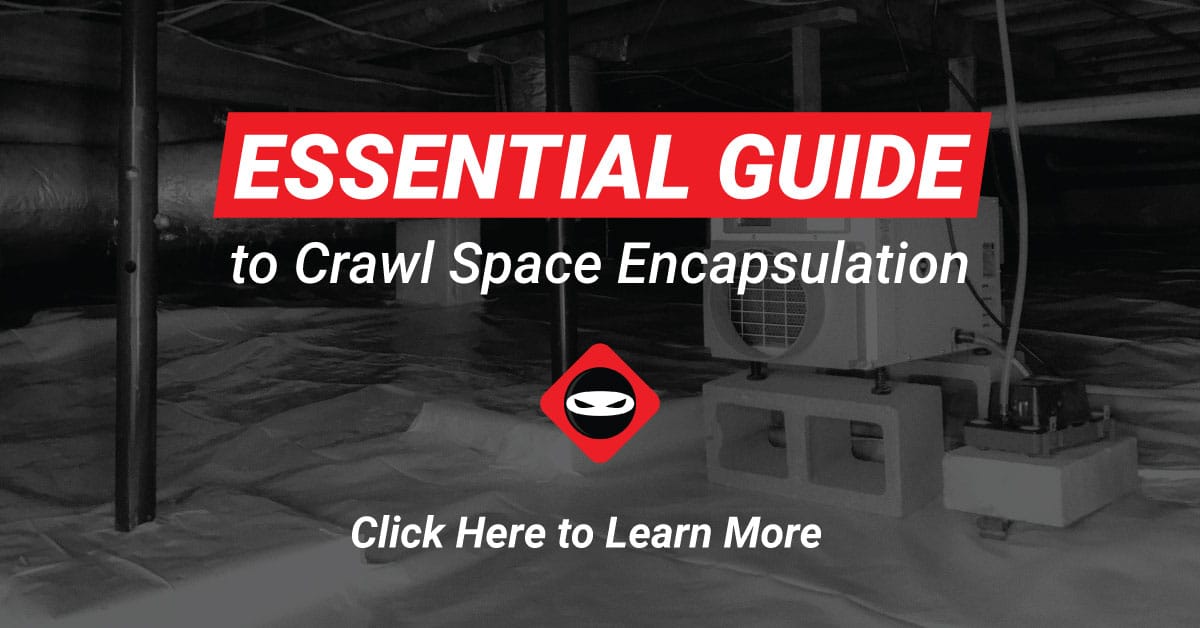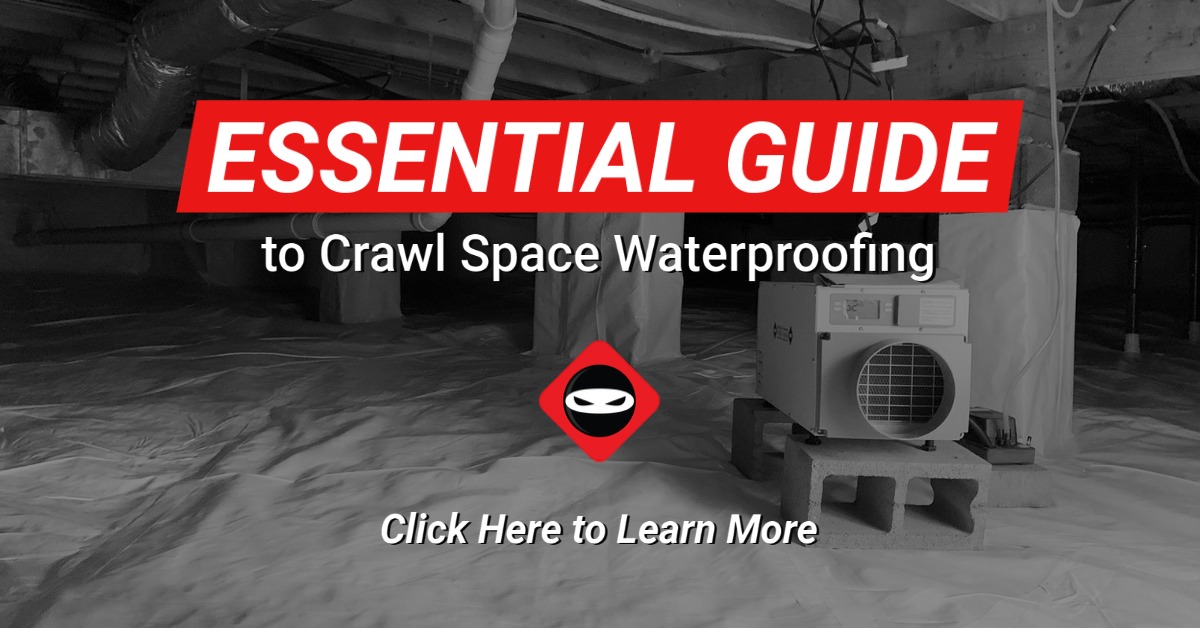The reason for this Essential Guide to Humidity Control is high humidity is extremely damaging and needs to be controlled. Controlling humidity in the entire home is important and often overlooked or misunderstood. The importance of controlling humidity in the entire home is often overlooked or misunderstood. Although our focus as a company is on crawl spaces there are other areas in the home you should make sure humidity is under control. In this guide we will discuss humidity control in all areas of your home. We will also share the importance of humidity control and how it affects you and your home. Please be sure to ask questions or share your thoughts in the comments section below.
Why Your Home is Humid
Just like it takes no effort to become unhealthy, it takes no effort for your home to become humid. In fact, your home needs care and attention to ensure humidity does not get out of control. Crawl spaces and basements are naturally humid. Crawl space encapsulation and waterproofing are vital to keep humidity under control but there are other components that are needed and often overlooked.
Basement Humidity Control
Normally the home becomes humid from the environment. Water in soil under the home evaporates into humidity. Even basements with poured concrete floors experience moisture infiltration into the living space. The name given to plastic in our industry is vapor barrier. This can be misleading because it is not a barrier but a retarder. Perm ratings are assigned to plastic or crawl space vapor barrier to inform you on the amount of moisture that passes through it. Therefore, the laying of plastic alone or the pouring of a slab will not control humidity.
Humidity Control in Attics
Attics tend to be drier than crawl spaces. Roof leaks and high outside humidity is the culprit in most cases for a humid attic. The living space can suffer high humidity caused by the crawl space, basement, or attic. Other sources of high humidity include garages, showering, overwatering plants, HVAC systems that are oversized or not properly maintained, and of course plumbing leaks. All of these things are adding humidity to the home.
Humidity’s Effect on You and Your Home
Humidity control is needed because it affects building materials, virus production, radon production, bacteria, mold, wood decay fungus and more. Everything from breathing to how hot or cold you feel is also affected by humidity. Humid environments typically make you feel warmer in the summer and cooler in the winter.
When your home is humid it inhibits the ability for you to sweat. The inability to sweat makes you feel hotter. This does not mean it is hotter, it just feels that way. The heat index shared by meteorologists is calculated by the temperature and relative humidity. Normal humidity levels and the heat index is the same as the air temperature. High humidity levels cause the heat index, or how hot your body thinks is the temperature, to increase. High heat and high humidity are a cause of alarm to children and the elderly with compromised immune systems. Controlling humidity may make you feel more comfortable.
Asthma Sufferers and High Humidity
Humidity may cause an asthma sufferer to have attacks more often. This can be for several reasons. According to Healthline.com, “Breathing in humid air activates nerves in your lungs that narrow and tighten your airways. Humidity also makes the air stagnant enough to trap pollutants and allergens like pollen, dust, mold, dust mites, and smoke. These can set off your asthma symptoms.”
Humidity also affects dust mite production. According to WebMD.com, dust mites are the #1 cause of asthma among children. Entire colonies of dust mites live in your bedding, pillows, carpets, and air duct systems. It is estimated that a single ounce of dust contains over 136,000 dust mites. Small children with plush toys could be snuggling a dust mite colony that is contributing to allergies and asthma. According to the EPA, “Reducing relative humidity is a practical way to control dust mites and their allergens in homes in temperate climates.”
What is the Best Humidity Level?
Although this guide to humidity control focuses mainly on high relative humidity. It is essential to keep humidity levels from getting too low. Low humidity can also create problems I will discuss below. According to experts, the best humidity levels for most homes is between 45% and 55%. Humidity above 60% allows mold and dust mite levels to grow rampant. Relative humidity levels below 40% contribute to virus growth, respiratory infections, radon production, and asthma attacks. Humidity levels in the 45% and 55% range also help your body to feel more comfortable.
Crawl Space Humidity Control
No amount of plastic and air sealing will keep a crawl space free of high humidity in a humid environment with a properly sized dehumidifier. Many crawl space encapsulation companies push the narrative of plastic or vapor barriers will control humidity. This is true but also misleading. The proper installation of crawl space vapor barrier is vital to humidity and moisture control. The fact however is that it is only one piece of the puzzle. Vapor retarders slow but do not stop moisture from entering the crawl space.
Air Sealing Crawl Space
Air sealing the crawl space and door are helpful but not the solution to high humidity. If a crawl space has foundation vents, sealing them is important. However, sealing crawl space vents and laying ground plastic will not control humidity to the levels mentioned above. Dew point can cause ducts and other cold materials in the crawl space to sweat. This can occur with a sealed and encapsulated crawl space. Sweating HVAC duct-work is a huge problem in crawl spaces that are not properly encapsulated with humidity control.
Crawl Space Dehumidifier
The crawl space dehumidifier is vital and often not installed during crawl space encapsulation. No amount of plastic and air sealing will keep high moisture levels from entering the crawl space. Air sealing and plastic does retard or slow the moisture but without a properly sized dehumidifier, humidity will continue to go unchecked. The crawl space dehumidifier is the heart of humidity control. Due to it being one of the most expensive components to humidity control, many homeowners allow themselves to be talked out of it.
Encapsulating the Crawl Space
The dehumidifier is so vital, we don’t recommend a full encapsulation without it. In fact, the crawl space dehumidifier is often the very first thing we recommend. Even a crawl space with loosely sealed vents and a subpar vapor barrier will perform better than an air sealed and encapsulated crawl space minus the dehumidifier. If you are concerned about high humidity and you have a crawl space, the dehumidifier must be added to the project’s budget.
Ready to find out more?
Drop us a line today for a free quote!
Is a Basement Dehumidifier Necessary?
Many homes with basements suffer the same problems as homes built with crawl spaces. Outside footer drain failure can create flooding problems. Hydrostatic pressure builds on the foundation walls and forces moisture into the living space. Even finished basements with temperature control systems are not immune to high humidity.
Basement waterproofing companies often address flooding issues with an interior waterproofing system that leads to a sump pump. The sump pump pit or basin gathers the water so the pump can discharge excess foundation or ground water from your basement. This is a great and many times less expensive way to address basement flooding problems. However, humidity can still be a problem in a finished basement with a waterproofing system.
Cooler Basements May be More Humid
Basements tend to run cooler than the living space built above them. The soil surrounding a basement can maintain a cooler temperature versus the air surrounding the living space. This cooler temperature is transferred into the basement. Often, the air conditioning system in the basement runs less due to the cool soil. This can be the cause of high humidity along with potential overlooked plumbing leaks.
If the air conditioning system is running less, it is controlling humidity less. For your HVAC system to cool outside air, it must lower humidity. In a well-functioning HVAC system, the humidity is often in the 40s or lower as it blows the cooler air through the duct-work. This is acting as a dehumidifier for your basement. If your basement is cool and does not engage the thermostat, the conditioned drier air is not being added to the basement. This lack of low humid air will allow the basement to build up high humidity. Therefore, we recommend a basement dehumidifier to control humidity. The dehumidifier will work independently of the HVAC system and lower dangerous levels of humidity with engaging the HVAC system.
Garage Humidity Can Affect the Living Space
I see garage doors being left open all over the country. Some homeowners have a small opening for their animals to seek refuge while others keep it open to enjoy a shady spot to relax and watch the wildlife or the neighborhood. While this seems harmless, the humidity levels being allowed to enter and build up in the garage can have a negative effect on the home, especially rooms located above the garage.
Another issue with humid garages is many homes are built with the HVAC system located there. The HVAC system will often begin to condensate and draw humid air into the duct-work. Humid duct-work air is then pushed to the living space and of course raising humidity. Installing a garage dehumidifier is a great idea but if you are in the habit of keeping your garage door open, it is extremely important.
I don’t leave my garage door open and my dehumidifier runs many times a day. My garage is also finished with drywall and insulated and still the dehumidifier runs many times a day. If you keep your garage door open the dehumidifier will not doubt run constantly. The advantage is when you close the garage up in the evening, the garage dehumidifier will have an opportunity to lower the humidity and help prevent mold from growing in the garage.
What Next?
Do you need help with mold removal, crawl space encapsulation, crawl space insulation, vapor barrier, waterproofing, or controlling humidity in your crawl space and you live in Alabama, Georgia, Delaware, North Carolina, South Carolina, Tennessee, or Kentucky? If so, please contact us to schedule your assessment. Also, let us know in the comments below if you’d like to suggest a future blog post.
Perhaps you’d like to tackle your own crawl space repair. Visit our DIY Store.
Contact us if you need help fixing your crawl space or yard drainage by clicking here.
Learn about Crawl Space Ninja Franchise opportunities.





1 thought on “Essential Guide to Humidity Control”
Thank you for posting this, Michael. I just sent the link to a Marietta GA homeowner who contacted us today with humidity issues.